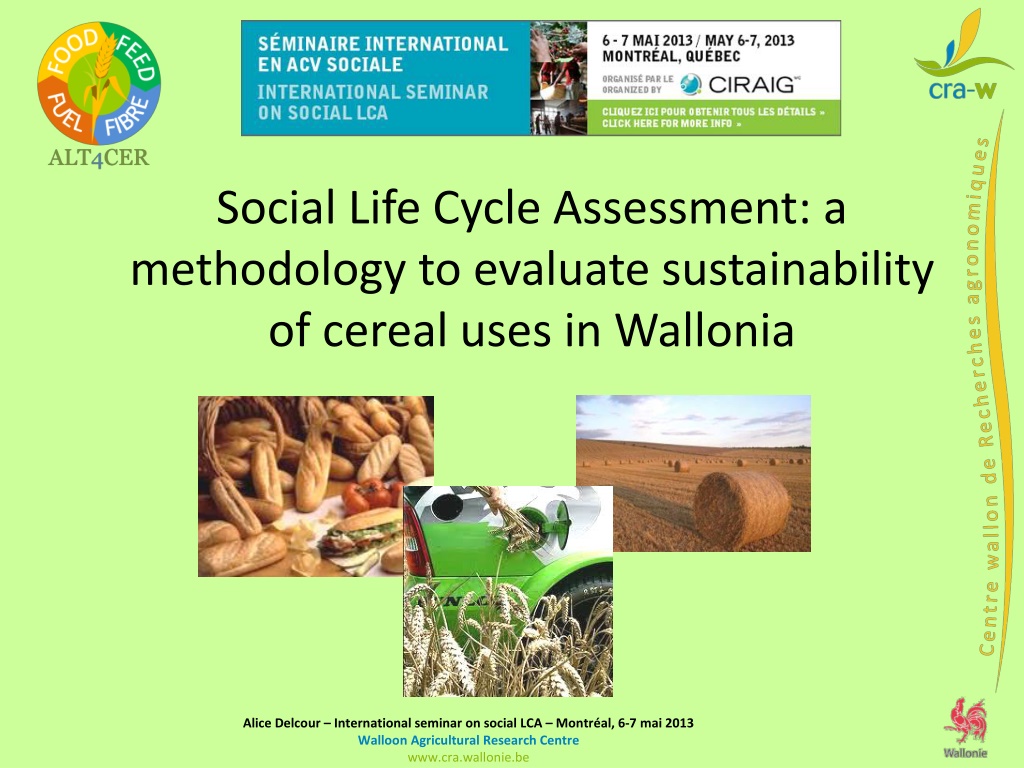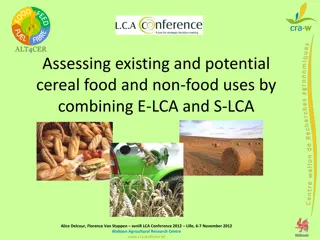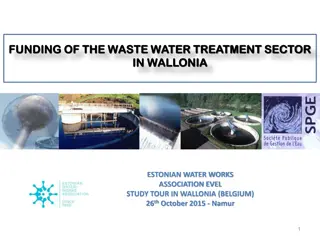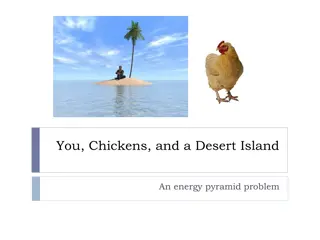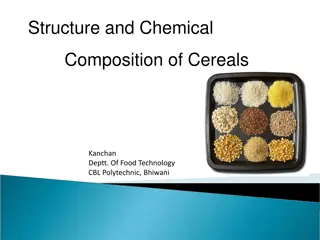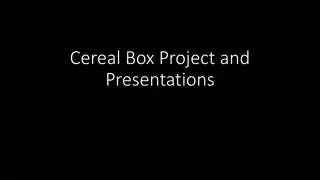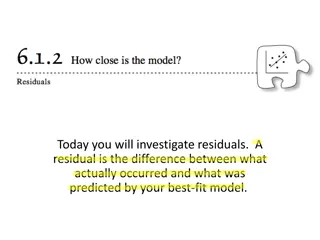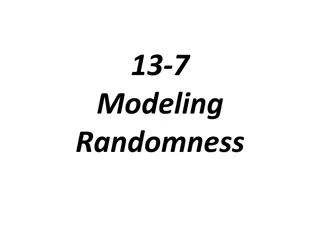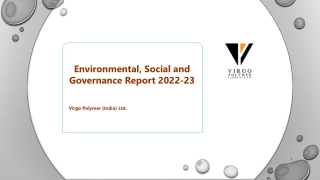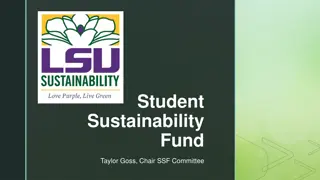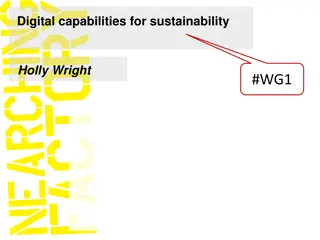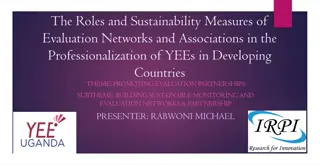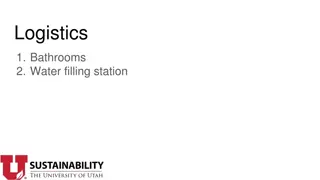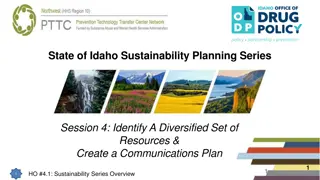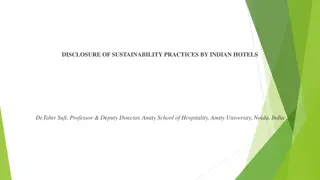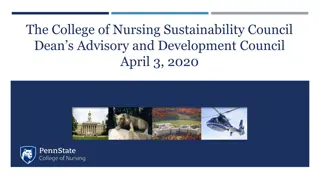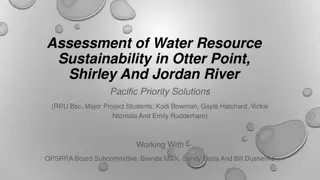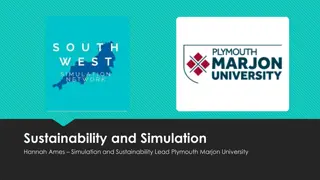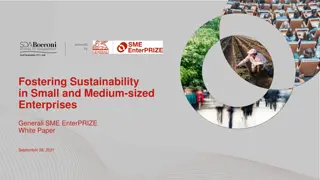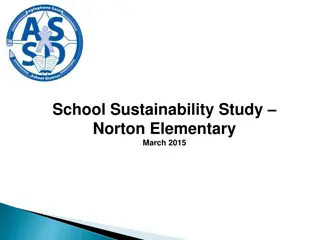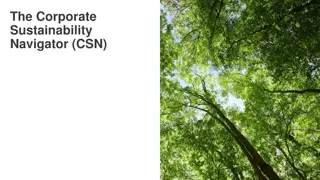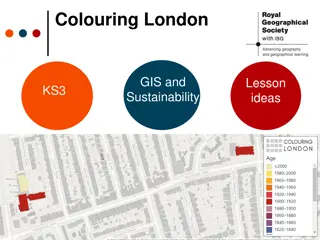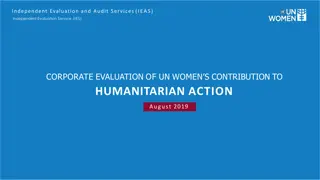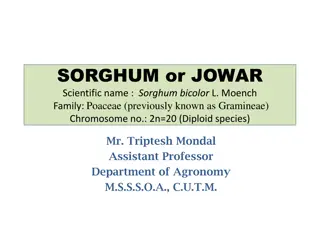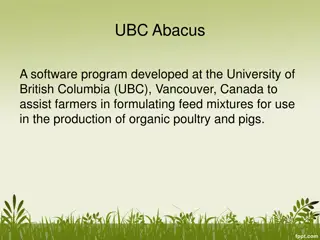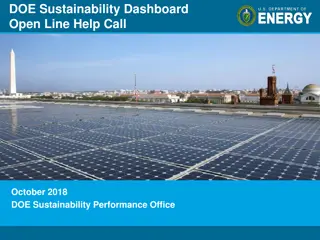Sustainability Evaluation of Cereal Uses in Wallonia
The Social Life Cycle Assessment methodology is used to assess the sustainability of cereal uses in Wallonia, focusing on food, non-food, and potential future uses. The study involves stakeholder engagement, scenario development for 2030, analysis of local data, and identification of sustainable uses. Four contrasting scenarios are examined for future cereal use, considering factors like climate change, political choices, and population growth.
Download Presentation

Please find below an Image/Link to download the presentation.
The content on the website is provided AS IS for your information and personal use only. It may not be sold, licensed, or shared on other websites without obtaining consent from the author. Download presentation by click this link. If you encounter any issues during the download, it is possible that the publisher has removed the file from their server.
E N D
Presentation Transcript
Social Life Cycle Assessment: a methodology to evaluate sustainability of cereal uses in Wallonia Alice Delcour International seminar on social LCA Montr al, 6-7 mai 2013 Walloon Agricultural Research Centre www.cra.wallonie.be
Cereals food and non-food uses: 4F Cereals Human food uses Animal feed uses Material uses Energy uses FUEL FIBRE FOOD FEED Alice Delcour International seminar on social LCA Montr al, 6-7 mai 2013 Walloon Agricultural Research Centre www.cra.wallonie.be
ALT-4-CER: which Fs of the 4F for Wallonia? Key steps: STAKEHOLDERS 1. To draw the portrait of the Walloon cereals, and their current and future/potential uses To define several scenarios 2030 acc. to current trends (B-a-U) and contrasting breaks To develop environmental and socio- economic LCA methodologies fed with local data To integrate environmental and socio- economic aspects through multi- criteria analysis with stakeholders To provide clues for most sustainable and pertinent uses of the cereal resources in Wallonia questions / answers 2. SCENARIOS 4F 3. adaptation answers E-LCA S-LCA 4. demand offer LOCAL DATA Alice Delcour International seminar on social LCA Montr al, 6-7 mai 2013 Walloon Agricultural Research Centre www.cra.wallonie.be
Walloon cereals: 2010 FORAGE MAIZE whole plant 2 654 kt CEREAL GRAINS 1 578 kt RETURN to soil 547 + 68 kt grain maize included Self-consumption and losses 14 % 10 % Collected GRAINS 1 357 kt Key ANIMAL LITTER 547 kt STRAW 684 kt 2 % 80 % FOOD FEED FUEL FIBRE 98 % 17 % Export 10 % BIOGAS 8 440 000 m ANIMAL FEED 2 601 + 68 kt INTERNAL MARKET 1 130 kt Walloon Origin Belgian consumption kt = 1000 tonnes 45 % 44 % 10 % 1 % ANIMAL FEED INDUSTRY 504 kt 3 316 kt (180 kt transfo. in Wallonia) STARCH INDUSTRY 501 kt 1 400 + 2 700 kt MALT INDUSTRY 8 kt 993 kt MILLING INDUSTRY 117 kt 1 523 kt AGRO-FOOD INDUSTRY BIOFUEL INDUSTRY 1 400 kt BAKERIES BREWERIES CHEMISTRY ANIMAL FEED INDUSTRY Alice Delcour International seminar on social LCA Montr al, 6-7 mai 2013 Walloon Agricultural Research Centre www.cra.wallonie.be Coproducts 183 400 kg Bioethanol 432 000 m
Scenarios 2030 4 contrasted scenarios for potential future uses: Defined with stakeholders support; Based on current trends and contrasting breaks; Key hypotheses: climate change, political choices, population growth, animal products consumption, etc. 1. 2. 3. Business-as-Usual: current trends extrapolated from past 15 years Strategic: environmental, economic and social optimization of current system Localisation: development of new cereal conversion units in Wallonia + increased autonomy Globalisation: massive export + focus on high added-value products (biorefinery, bio-based chemistry) 4. Alice Delcour International seminar on social LCA Montr al, 6-7 mai 2013 Walloon Agricultural Research Centre www.cra.wallonie.be
6% 31% 16% 13% 5% 6% 8% 16% 17% 9% 12% 4% 15% 16% 25% 33% 28% 64% 11% 57% 43% 28% 36% Scenarios 2030: Grains + straw + forage maize 4 500 4 000 6% 3 500 16% 31% 3 000 13% 5% Export 6% 1000 T DM 8% 2 500 17% 16% 9% Fibre (litter, insulator) 12% Fuel/Biorefinery 1G+2G 2 000 16% 28% 11% 33% Feed 1 500 Food 64% 43% 1 000 57% 36% 500 28% 25% 15% 4% 0 2010 - baseline 2030 - B-a-U 2030 - strategic 2030 - localisation 2030 - globalisation Alice Delcour International seminar on social LCA Montr al, 6-7 mai 2013 Walloon Agricultural Research Centre www.cra.wallonie.be
Scenarios analysis with E-LCA & S-LCA Cover the 3 pillars of sustainable development Common objective: evaluate environmental and socio- economic consequences of potential changes in the uses of Walloon cereals by 2030, in comparison with current situation (2010) Society Ecology Economy Alice Delcour International seminar on social LCA Montr al, 6-7 mai 2013 Walloon Agricultural Research Centre www.cra.wallonie.be
Scenarios analysis with E-LCA Environmental LCA identify regional differencies regarding the cultivation step: (New) cropping practices; Machinery characteristics & fuel consumption; Direct field emissions assessment; Inputs management; Animal feeding & husbandry; etc + Conversion processes based on existing facilities Alice Delcour International seminar on social LCA Montr al, 6-7 mai 2013 Walloon Agricultural Research Centre www.cra.wallonie.be
Scenarios analysis with S-LCA Stakeholders categories Workers Companies Farmers Impact categories Impact subcategories Workings hours Health and safety at work Local employment Added value creation Working conditions Socio-economic repercussions Alice Delcour International seminar on social LCA Montr al, 6-7 mai 2013 Walloon Agricultural Research Centre www.cra.wallonie.be 9
Data inventory in S-LCA Working conditions: interviews: Using methodology Bilan Travail (production step): Developed by INRA in order to assess work types and share for animal rearing systems To be adapted for crop systems Use farms accounting data collected at the Walloon Region level (FADN-like) (production step) Conversion step: data collection from existing facilities Alice Delcour International seminar on social LCA Montr al, 6-7 mai 2013 Walloon Agricultural Research Centre www.cra.wallonie.be 10
Multi-criteria Analysis Integrate environmental and socio-economic impacts (E-LCA & S-LCA results) Involve stakeholders (producers, policy makers, consumers): Identify most relevant impact categories, group/prioritize (Weight into a global performance indicator?) Alice Delcour International seminar on social LCA Montr al, 6-7 mai 2013 Walloon Agricultural Research Centre www.cra.wallonie.be 11
Human & eco-toxicity Ozone layer depletion Human health Climate change Ecosystem quality Acidification LCI data Eutrophication Resources Integration Abiotic resources use Working hours Working conditions Health & Safety at work Local employment Socio-economic repercussions E-LCA Added value creation S-LCA Subcategories Impact categories Alice Delcour International seminar on social LCA Montr al, 6-7 mai 2013 Walloon Agricultural Research Centre www.cra.wallonie.be 12
ALT-4-CER: Expected results Key features of the project: To involve local stakeholders in all steps (scenario building, data collection, impact weighting) To use local data for local issues Answer key questions raised today in human Societies: What type of agriculture do we want for tomorrow? Is it ethically, environmentally and economically sustainable to dedicate cereals resources to other uses than human food? Alice Delcour International seminar on social LCA Montr al, 6-7 mai 2013 Walloon Agricultural Research Centre www.cra.wallonie.be
Thank you for your attention! Contact: Alice DELCOUR, Florence VAN STAPPEN Walloon Agricultural Research Centre a.delcour@cra.wallonie.be, vanstappen@cra.wallonie.be Alice Delcour International seminar on social LCA Montr al, 6-7 mai 2013 Walloon Agricultural Research Centre www.cra.wallonie.be
